#Edward Morgan Forster
Text
Edward Carpenter's full response letter to E.M. Forster after reading Maurice in 1914.
(The images of the letter can be found here at King's College's archive. Below is my transcription followed by photocopies of the letter. )
PS: 1) "MS" is the abbreviation for "manuscript".
23 Aug. [1914?]
My dear & blessed E.M.,
(I wish you had a name. Why do you always hide behind initials? What do your friends call you? My name is Edward, or ‘chips’!)
I have read your ‘Maurice’ after all, and am very much pleased with it. I don’t always like your rather hesitating tantalizing impressionist style - though it has subtleties - but I think the story has many fine points. You succeed in joining the atmosphere with the various characters, and there are plenty of happenings which is a good thing. Maurice’s love affairs are all interesting, and I have a mind to read them again, if I can find time - so I won’t send the MS back for a day or two. I am so glad you end up on a major chord. I was so afraid you were going to let Scudder go at the last - but you saved him and saved the story, because the end though improbable is not impossible and is the one bit of real romance - which those who understand will love.
I wish I could write more, but I am devoured just now by innumerable things. I expect to be in and about London from the 1st to 8th Sep. - so give me a cue to see you.
Your Edward C.
Transcription of vertical writings on the second page of the letter:
I am sending my birthday reply to the papers on Sep. 1 with a lot about the war in it.
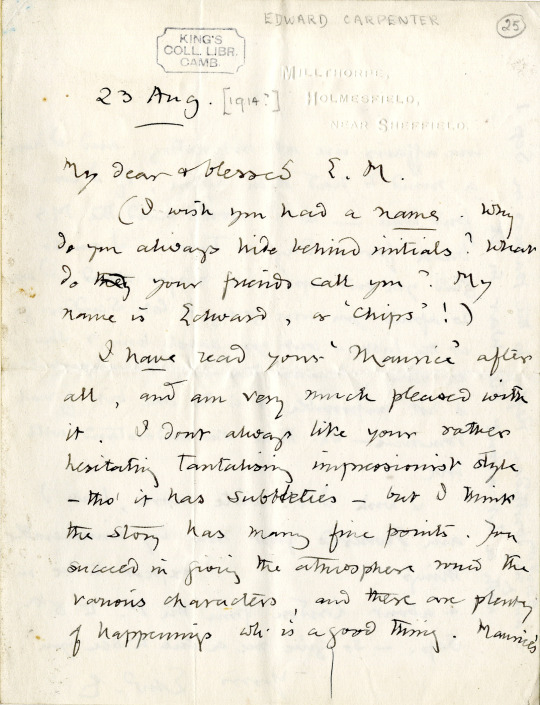
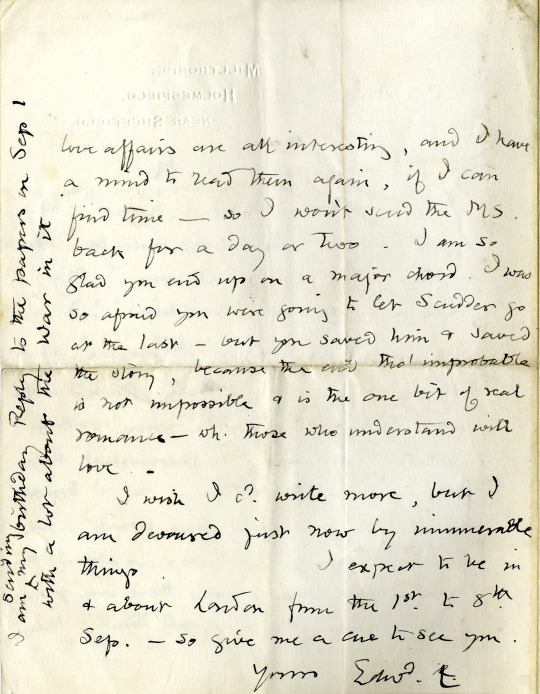
Only a small part of the letter has been transcribed then included in reviews, or different Maurice editions. Which is why I wanted to transcribe the whole response from the real-life Maurice to the author of fictional Maurice after he read Maurice. The entirety is far more interesting.
Below: Edward Carpenter in 1886 and 1897.

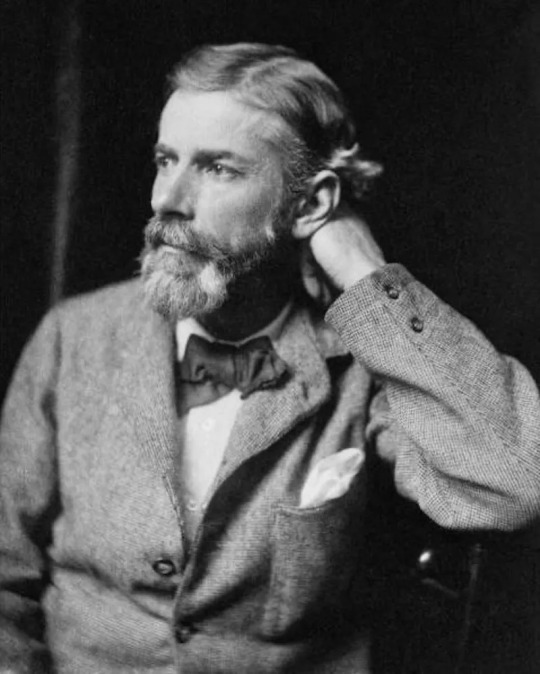
Some contexts: based on Forster's diaries, Maurice was first finished in June/July, 1914, so Carpenter did read the first complete MS—with or without the epilogue is unclear since there's no solid proof for when the epilogue was written (though it appeared in the novel by February 1915 at the latest.)
However, since Carpenter said he liked the happy ending he read (and fun fact: the first complete MS which he read actually had a fairly different ending between Maurice and Alec than the published version's), we know that even from the first draft, Forster remained unwavering about how a happy ending is imperative.

More contexts: according to a letter from Forster to a friend, he thought Carpenter was "too unliterary to be helpful"—meaning Carpenter probably wasn't much interested in reading literature. And Carpenter sort of confirmed that in writing "I read your 'Maurice' after all", implying he was indeed reluctant to read at first.
Still, it made absolute sense for Forster to send the story back to the man who, in a manner of speaking, held the copyright of Maurice in flesh before Forster even finished it.
So the question is: did Carpenter know that Maurice was inspired by him and his lover George Merrill? Did he know that he was the real-life Maurice and Merrill was the real-life Alec? Perhaps that was why he was reluctant to read the novel at first?
#edward carpenter#em forster maurice#maurice em forster#em forster#edward morgan forster#maurice#maurice 1987#maurice hall#maurice 1914#maurice 1971#alec scudder#george merrill#clive durham#1914#1910s
692 notes
·
View notes
Text
sometimes i remember that clive durham from maurice by e.m forster exists. guy was born in the late 19th century but always accepted himself as a gay man and loved being gay, then got a cold and turned heterosexual. objectively the funniest queer character ever written
#been a while since i read it but im pretty sure this is an accurate summary#clive durham#maurice#em forster#edward morgan forster
142 notes
·
View notes
Photo
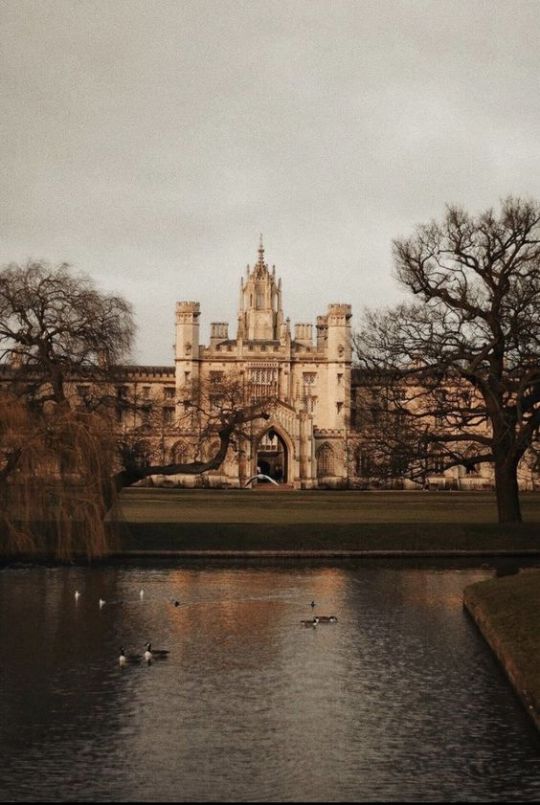

“I knew you read the Symposium in the vac," he said in a low voice.
Maurice felt uneasy.
"Then you understand - without me saying more - "
"How do you mean?"
Durham could not wait. People were all around them, but with eyes that had gone intensely blue he whispered, "I love you.”
― E. M. Forster, Maurice
Hi! I'm doing a new survey on Dark Academia for my university research on aesthetics, if you like it or know what it is I'd appreciate it if you could fill in the survey: https://forms.gle/xZRvM5pxF62bhDyn7 (Copy and paste the URL, otherwise it won't open)
Best regards and thanks in advance! 🖤
#cambridge#university#aes#aesthetic#maurice#em forster#lit#literature#quote#quotes#moodboard#mood#Moodboards#dark academia#da#light academia#dark poetry#academia#forster#Edward Morgan Forster#book#books#cottage#cottagecore#oxford
70 notes
·
View notes
Quote
Sì, era questa la ragione della sua venuta. Era la chiusura d’un libro che non sarebbe stato riletto mai più, e meglio valeva chiudere un libro del genere che lasciarlo in giro a insudiciarsi. Il volume del loro passato, bisognava riporlo nello scaffale che gli spettava, e questo, questo era il posto adatto, in mezzo al buio e a fiori marcescenti. Lo doveva anche ad Alec, non intendeva tollerare promiscuità di sorta fra il vecchio e il nuovo.
Maurice
#Maurice#Maurice Hall#Edward Morgan Forster#Maurice romanzo#citazioni#citazione#citazioni libri#citazione libro#lgbt#dark acadamia quotes#dark academia#dark acadamia aesthetic#fine di una relazione#relazione
8 notes
·
View notes
Text
historians: no one really knew [20th C historical person]’s sexuality so we cannot assume anything
the wikipedia page: they were friends with E M Forster
17 notes
·
View notes
Text
Mr Emerson is the only man i want him to be real and know me and be fond of me and be my neighbor and drink tea with me recommend me books and drink wine with me at sunset while we have a life altering conversations
2 notes
·
View notes
Text
"She had shut up her heart--almost, but not entirely."
E. M. Forster, Howards End
10 notes
·
View notes
Text
[La vita che verrà][Edward Morgan Forster]
Con la sua scrittura di rarefatta, limpida classicità, Forster esplora l'affascinante terra incognita che si stende oltre i limiti e le restrizioni della moralità comune.
Alla sua morte, nel 1970, Edward Morgan Forster lasciò nel King’s College di Cambridge una moltitudine di opere inedite: romanzi, tra cui il celebre Maurice, testi teatrali, poesie, saggi, e numerosi racconti. Da quel materiale è nata questa raccolta, pubblicata nel 1972, che copre l’arco di tempo dai primissimi anni del Novecento al 1962 circa. Storie che l’autore non volle pubblicare – a…

View On WordPress
#2023#British Fiction#E. M. Forster#Edward Morgan Forster#fiction#Forster#gay#La vita che verrà e altri racconti#LGBT#LGBTQ#Marcella Bonsanti#Mondadori#Narrativa#The Life to Come#The Life to Come And Other Short Stories#UK
0 notes
Text


Maurice, directed by James Ivory (1987)
#Maurice#james ivory#cinema#edward morgan forster#e m forster#english literature#dark academia#call me by your name
0 notes
Text
E.M. Forster really said I'm gonna criticise Platonic ideas of love between men through Clive and then later in the story straight up mirrors bits to Pausanias's speech in the Symposium...
#why should he be kind if he did not have his friend!#dear edward morgan that is what pausanias is saying#fuck off me#maurice#em forster
3 notes
·
View notes
Text
Learned another heartbreaking thing about E.M. Forster today

Source
[image description: three paragraphs of text from a website that read:
'Howard's End' author Edward Morgan Forster was born in London in 1879. He was a pacifist and served with the British Red Cross in Alexandria, Egypt during the First World War. His job was to interview the wounded in hospitals for information about fellow soldiers who were reported missing.
Although he never declared it in his lifetime, Edward was homosexual. Whilst serving in Egypt he had a three-year relationship with a young Egyptian, Mohammed el Adl. Their relationship ended in 1918 when Mohammed was forced to marry. Mohammed paid tribute to his lover by naming his son Morgan. After his death in 1922, Mohammed's widow sent Forster her husband's gold ring as a keepsake. Edward, by now back in Britain, slept with the ring under his pillow every night.
He continued to write novels and plays, and was nominated for 20 Nobel Prizes for Literature. Edward died in 1970.
/end description]
#em forster#literature#history#lgbt history#maurice em forster#this is my first time using an image description (my native language isn't english and I can't describe things well enough)#tell me if it can be improved‚ please
257 notes
·
View notes
Text
Lo attorniava uno stuolo di universitari illustri… tutti d’enorme intelletto e cultura. I compagni di Maurice avevano riso del Trinity, ma non potevano ignorarne lo sdegnoso splendore, o negargli la superiorità che quasi non si cura nemmeno di affermare. Lui ci era venuto a loro insaputa, umilmente, a chiedergli aiuto. La sua battuta di spirito svanì in quell’atmosfera, e il cuore gli batté violentemente. Ebbe vergogna, paura.
Le stanze di Risley erano in fondo a un breve corridoio nel quale, non essendoci ostacoli, mancava l’illuminazione, e chi doveva percorrerlo scivolava lungo la parete finché non andava a sbattere contro la porta. Maurice vi sbatté più presto di quanto avesse calcolato – fu un cozzo spaventoso – ed esclamò a voce alta: «Accidenti!» mentre vibravano i pannelli.
«Avanti,» disse una voce. Lo aspettava una delusione.
#Edward Morgan Forster#maurice#maurice frasi#maurice descrizioni#Maurice romanzo#romanzo#lgbt#citazioni#posto frasi che mi piacciono anche se sono non-sense so tense#citazioni libri#citazione libro#questo libro devasta#letteratura inglese#classici#classici inglesi#classico#citazione#e.m. forster#e.m. forster citazioni#letteratura#letteratura citazioni#letteratura citazione#dark academia#dark acadamia quotes
2 notes
·
View notes
Text

THE ROUND ONE RESULTS ARE IN!!!
another really fun opening round with some close calls and big names going out!! full results are below the cut:
Earl Carpenter VS Gavin Lee
Earl Capenter = 109 (91.6%)
Gavin Lee = 10 (8.4%)
Earl Carpenter WINS
Manoel Felciano VS Ted Keegan
Manoel Felciano = 61 (53%)
Ted Keegan = 54 (47%)
Manoel Felciano WINS
Jeremy Secomb VS Hadley Fraser
Jeremy Secomb = 30 (25.6%)
Hadley Fraser = 87 (74.4%)
Hadley Fraser WINS
Matt Seadon-Young VS Niall Sheehy
Matt Seadon-Young = 26 (23.9%)
Niall Sheehy = 83 (76.1%)
Niall Sheehy WINS
Jeremy Stolle VS Ben Forster
Jeremy Stolle = 88 (76.5%)
Ben Forster = 27 (23.5%)
Jeremy Stolle WINS
Tommy Körberg VS Tim Morgan
Tommy Körberg = 52 (47.3%)
Tim Morgan = 58 (52.7%)
Tim Morgan WINS
Ramin Karimloo VS Brian D'Arcy James
Ramin Karimloo = 64 (52.9%)
Brian D'Arcy James = 57 (47.1%)
Ramin Karimloo WINS
Tom Hewitt VS Malcolm Forbes Peckham
Tom Hewitt = 67 (58.8%)
Malcolm Forbes Peckham = 47 (41.2%)
Tom Hewitt WINS
Raul Esparza VS Brian Stokes Mitchell
Raul Esparza = 90 (78.3%)
Brian Stokes Mitchell = 25 21.7%)
Raul Esparza WINS
Josh Groban VS Laird Mackintosh
Josh Groban = 55 (44.4%)
Laird Mackintosh = 69 (55.6%)
Laird Mackintosh WINS
Simon Bailey VS Gareth Snook
Simon Bailey = 68 (71.6%)
Gareth Snook = 27 (28.4%)
Simon Bailey WINS
Norm Lewis VS Derek Klana
Norm Lewis = 86 (79.6%)
Derek Klana = 22 (20.4%)
Norm Lewis WINS
Dave Willetts VS Will Swenson
Dave Willetts = 32 (32%)
Will Swenson = 68 (68%)
Will Swenson WINS
Harry Hadden-Patton VS John Owen Jones
Harry Hadden-Patton = 26 (74.8%)
John Owen Jones = 77 (25.2%)
John Owen Jones WINS
Adam Pascal VS Christopher Plummer
Adam Pascal = 17 (15.9%)
Christopher Plummer = 90 (84.1%)
Christopher Plummer WINS
Hugh Panaro VS Killian Donnelly
Hugh Panaro = 72 (67.9%)
Killian Donnelly = 34 (32.1%)
Hugh Panaro WINS
Julian Ovenden VS Patrick Page
Julian Ovenden = 41 (38.7%)
Patrick Page = 65 (61.3%)
Patrick Page WINS
Terrence Mann VS Franc D'Ambrosio
Terrence Mann = 82 (78.8%)
Franc D'Ambrosio = 22 (21.2%)
Terrence Mann WINS
Peter Lockyer VS Stewart Clarke
Peter Lockyer = 69 (69.7%)
Stewart Clarke = 30 (30.3%)
Peter Lockyer WINS
Mandy Patinkin VS Cameron Blakely
Mandy Patinkin = 81 (77.1%)
Cameron Blakely = 24 (22.9%)
Mandy Patinkin WINS
Philip Quast VS Matt Harrop
Philip Quast = 68 (69.4%)
Matt Harrop = 30 (30.6%)
Philip Quast WINS
Howard McGillin VS Greg Mills
Howard Mcgillin = 47 (50%)
Greg Mills = 47 (50%)
DRAW (Tie break will be posted after these results are published)
Robert Lindsay VS Christian Borle
Robert Lindsay = 63 (66.3%)
Christian Borle = 32 (33.7%)
Robert Lindsay wins
Dean Chisnall VS Edward Baker-Duly
Dean Chisnall = 85 (94.4%)
Edward Baker-Duly = 5 (5.6%)
Dean Chisnall WINS
Jon Robyns VS Bronson Norris Murphy
Jon Robyns = 77 (78.6%)
Bronson Norris Murphy = 21 (21.4%)
Jon Robyns WINS
Hayden Tee VS Bradley Dean
Hayden Tee = 40 (44.4%)
Bradley Dean = 50 (55.6%)
Bradley Dean WINS
Fred Johanson VS Ken Watanabe
Fred Johanson = 13 (13.7%)
Ken Watanabe = 82 (86.3%)
Ken Watanabe WINS
Michael Ball VS Alfie Boe
Michael Ball = 48 (50.5%)
Alfie Boe = 47 (49.5%)
Michael Ball WINS
36 notes
·
View notes
Text
Reading a room with a view, so far i would gladly drown cecil, watch the life drain from his eyes while holding him underwater :/
1 note
·
View note
Text
"Helen loved the absolute. Leonard had been ruined absolutely,"
E. M. Forster, Howards End
2 notes
·
View notes
Text
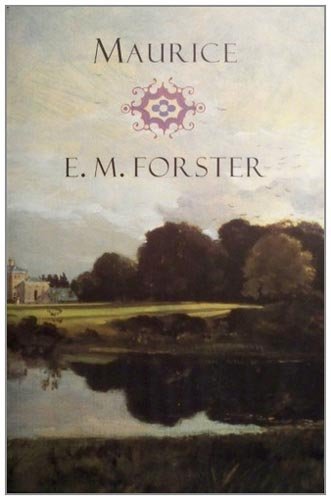
Born into an Anglo-Irish and Welsh family in London on January 1, 1897, Edward Morgan Forster was originally intended to be called Henry, though at his christening he was accidentally baptized Edward. This also being his father's name, young Edward became known in family circles as Morgan, so as to differentiate him from his father.
Considered one of the greatest English novelists of the twentieth century, E.M. Forster was educated at Tonbridge School, and later King's College, Cambridge; where, as an undergraduate, he became a member of a the Apostles; a society who met in secret to discuss their work on and about philosophical and moral questions; the group later being known as the Bloomsbury Group (sometimes referred to as the Bloomsbury Set). He advocated individual liberty and penal reform; opposed censorship; was President of the Cambridge Humanists, and also a member of the Advisory Council of the British Humanist Association; his views as a humanist, being at the heart of his work, which often depicts the pursuit of personal connections in spite of the restrictions of contemporary society.
A gay man, Forster developed a long-term relationship with Bob Buckingham; Forster's circle of friends also including Benjamin Britten, Christopher Isherwood, Siegfried Sassoon and Forrest Reid.
E.M. Forster was elected an honorary fellow of King's College, Cambridge; declined a knighthood in 1949; was made Companion of Honour in 1953; and made a member of the Order of Merit in 1969.
When Forster's cousin, Philip Whichelo, donated a portrait of Forster to the Gay and Lesbian Humanist Association (GLHA), Jim Herrick, the founder, quoted Forster's words: 'The humanist has four leading characteristics – curiosity, a free mind, belief in good taste, and belief in the human race'.
Edward passed on June 7, 1970. He was 91. His ashes, mingled with those of Buckingham, were later scattered in the Rose Garden of Coventry's crematorium, near Warwick University.
*
'Maurice' (1971; published posthumously): a homosexual love story set in early twentieth century England, which follows its main character, 'Maurice Hall' (played by James Wilby in James Ivory's 1987 film adaptation for Merchant Ivory Productions), through university, a tumultuous relationship with 'Clive' (played by Hugh Grant), his struggles to fit into society, and ultimately being united with his life partner, 'Alec' (played by Rupert Graves).
Ivory's usual writing partner being unavailable, he wrote the screenplay with Kit Hesketh-Harvey; who, like Forster, had also been educated at Tonbridge School and Cambridge University, and therefore knew the background. Ivory later said: 'What Kit brought to the script was his social background […] His knowledge of the British upper middle class was incredibly useful – the dialect, the speech, the slang, and so many other things. As an American, I could not have possibly written the script without him'.
The film was largely shot on location in the halls and quadrangles of King's College, Cambridge, including interiors in the college's chapel; the other interiors, primarily shot at Wilbury Park, a Palladian house in Wiltshire.
53 notes
·
View notes